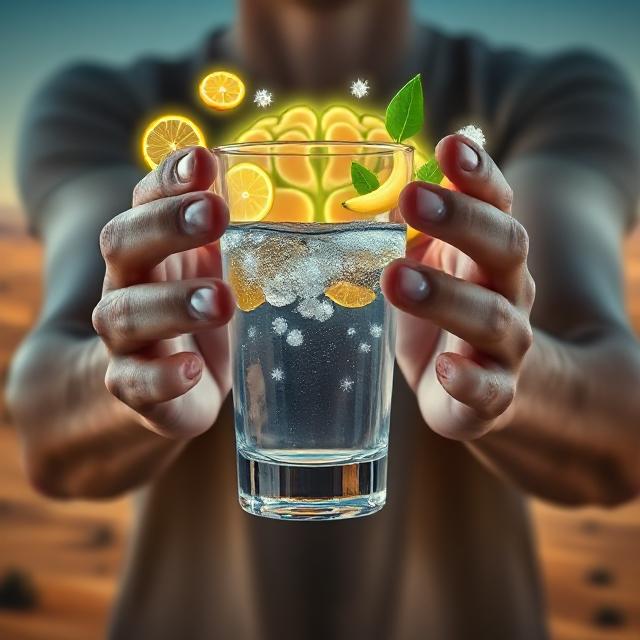
Table of Contents
Hydration Myths: Why Plain Water Isn’t Enough
If you’ve ever felt sluggish, dizzy, or mentally foggy—even after drinking lots of water—you’re not alone. A common hydration myth says the solution to fatigue or brain fog is simple: “Just drink more water.” But here’s the truth: hydration is not just about water—it’s about balance.
This article unpacks common hydration myths and explains why plain water often isn’t enough to truly hydrate your brain and body. We’ll explore the science of fluid balance, the critical role of electrolytes, and how to build a smarter hydration strategy to support focus, energy, and mood.
💧 Myth #1: Drinking More Water = Better Hydration
We’re told to aim for 8 glasses of water a day. But hydration is more than volume—it’s about what gets absorbed, where it goes, and what it displaces.
When you drink plain water in large quantities, especially without food or salt:
- It can dilute your blood sodium levels (hyponatremia), impairing nerve function.
- It may increase urination without improving cellular hydration.
- It can flush out critical minerals like potassium and magnesium.
Fact: You can drink water all day and still be dehydrated at the cellular level.
⚡ The Missing Link: Electrolytes
Electrolytes—especially sodium, potassium, magnesium, and chloride—are minerals that dissolve in water and conduct electrical signals. They’re essential for:
- Brain signaling and neurotransmitter function
- Muscle contractions, including the heart
- Nutrient transport into and out of cells
- Water retention in tissues and organs
Without sufficient electrolytes, water doesn’t get properly used—it simply passes through.
🧠 Why Brain Function Suffers Without Electrolyte Balance
Your brain operates on electricity. That means hydration isn’t just about fluid—it’s about ionic conductivity.
Low electrolyte status can result in:
- Brain fog
- Headaches
- Mood swings
- Decreased focus
- Fatigue or lightheadedness
Many people experience these symptoms not because they’re dehydrated, but because they’re electrolyte depleted—especially if they follow low-salt diets, fast, or drink lots of coffee.
🥤 Myth #2: All Hydration Drinks Are the Same
Sports drinks, flavored waters, and even some “electrolyte” products are often loaded with:
- Excess sugar
- Artificial sweeteners
- Low-quality minerals in poorly absorbed forms
What you want is bioavailable, balanced electrolyte support—with minimal fillers.
Look for electrolyte formulas with:
- Sodium (ideally 500–1000 mg per serving)
- Potassium (200–400 mg)
- Magnesium (100–200 mg)
- Chloride and trace minerals like zinc or calcium
Natural sea salt, lemon juice, and mineral water can also support balance.
🚽 Myth #3: Clear Urine Means You’re Hydrated
This might shock you: clear urine can indicate overhydration.
While dark urine often signals dehydration, crystal-clear urine—especially if frequent—can mean you’re flushing electrolytes. Optimal hydration is reflected in:
- Pale straw-colored urine
- Steady mental clarity
- Stable energy levels
Instead of chasing clear pee, aim for consistent fluid and mineral intake throughout the day.
🥦 Food, Electrolytes, and Hydration
Don’t forget: whole foods are a major source of hydration and electrolytes.
- Avocados: potassium, magnesium
- Leafy greens: calcium, magnesium
- Salted bone broth: sodium, chloride, trace minerals
- Bananas & coconut water: potassium
- Seaweed: iodine, sodium, potassium
These support hydration while nourishing your body in a holistic way.
🧪 Real Hydration Strategy for Brain Performance
Here’s a daily rhythm that supports hydration and mental clarity:
| Time | Action |
|---|---|
| Morning | 16 oz warm water + sea salt + lemon |
| Mid-morning | Electrolyte powder (no sugar) + light snack |
| Lunch | Hydrating foods: greens, avocado, fruit |
| Afternoon | Small mineral water, sip slowly |
| Evening | Herbal tea with trace minerals or broth |
✅ Summary: Hydration Is a Mineral Equation
Hydration myths have led many to overconsume water while ignoring electrolytes. The result? More fatigue, more fog, and less focus.
True hydration is electrolyte-powered.
If you’re serious about cognitive energy, metabolic function, or stress resilience, don’t fall for the “just drink more water” mantra. Instead, build a smart hydration routine—one that balances fluids and minerals in sync with your brain and body’s real needs.